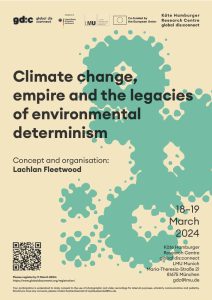18-19 March, climate change, empire and the legacies of environmental determinism

We live in a time when concern about human effects on the environment and climate are greater than ever. For much of human history, however, the opposite was true, and environments’ and climates’ effects on people were often the more pressing concern. Environmental or climatic determinism – the idea that people are shaped physically, culturally and even morally – by their environments has a long and often insidious history.
Determinist thinking had particular utility in the age of European and global empires in the 19th and 20th centuries, taking on new forms amidst attempts to expand and justify imperial dominance. Everything from ‘energy’ to racial characteristics and from ‘civilisational success’ to the limits of habitability were seen as environmentally and climatically determined. Today, these ideas are once again being reconfigured in new and troubling ways, such as in the deterministic language sometimes employed around climate and migration, which risks echoing racist, early 20th-century visions of ‘nomadic hordes’. With the Anthropocene concept placing human and planetary histories and futures on the same scale, tracing the language of environmental determinism has become imperative.
This two-day workshop, hosted by the Käte Hamburger Research Centre global dis:connect at the LMU Munich, will thus contextualise environmentally determinist ideas historically and examine their imperial legacies in the face of today’s climate crisis.
Place & date: Munich, 18-19 March2024
Organiser: Lachlan Fleetwood (LMU Munich)
Venue: Käte Hamburger Research Centre global dis:connect, Maria-Theresia-Straße 21, 81675 Munich
Please click here to download the programme.
Please register here by 11 March.





